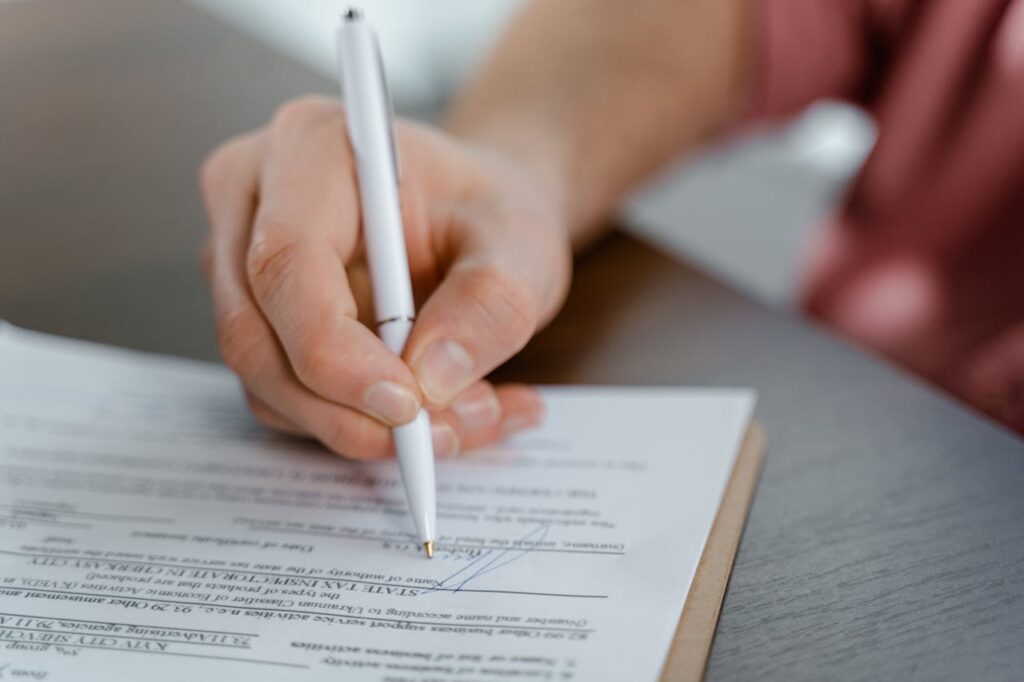
A deed of covenant sounds like a daunting and complex legal term, but it’s actually fairly straightforward and common, especially for leasehold properties. In this blog, I will detail exactly what is meant by deed of covenant, the different types of deeds of covenant you may encounter when buying a leasehold property, legal implications, and more. If you are a property investor, landlord or homeowner, having a good understanding of deeds of covenant is important, as it helps you understand your legal rights and responsibilities.
Table of Contents
ToggleThe word ‘Covenant’ means promise and a deed makes the promise legally binding. A deed of covenant is a legal agreement between the leaseholder and the freeholder of a property. It is a written document that both parties must sign in person as part of the conveyancing process when buying a property, and witnessed by a third party or sometimes, two third parties. The leaseholder and freeholder should both retain an assigned copy of the deed of covenant.
No, every leasehold property does not necessarily have a deed of covenant, but it is very common and usually stipulates the payment of things like ground rent or any applicable service charges.
A deed of covenant enables a landlord or freeholder to add terms to an existing lease and records additional rights and obligations between the tenant and landlord. They can be used to add or modify lease terms without drafting a new lease, which can be time-consuming and cost much more than a deed of covenant. They may be used to add or modify lease terms including rent reviews, repair responsibilities, allowing modifications to the property or allowing it to be used for a business.
Legal fees for a deed of covenant are around £300, which is quite cheap, considering the thousands that could be spent on an entirely new lease contract.
There are different types of covenant deeds in the UK, divided into two main categories: positive and negative covenants. Positive covenants are things that a leaseholder must do, and negative covenants are things a leaseholder must not do. Here are some examples of both:
A deed of covenant is legally binding for both parties, much like any contract. If a party breaches the terms, the other can seek compensation through the courts. Before signing a deed of covenant or any other contract, it’s a good idea to have a solicitor or other legal professional look into it first and make sure you understand the terms that you are agreeing to before signing it.
Yes, you usually can see deeds of covenant, restrictive covenants and other similar information on the Title Register of the property held by the Land Registry.
Technically, yes, a leaseholder could refuse to sign a deed of covenant. However if this is done during the conveyancing process of buying the property, this may cause the sale of the property to fall through and could have other legal or financial consequences. If you have some issues with the terms included in the deed of covenant, e.g. they are too rigid or unreasonable, then you could raise this with the landlord’s solicitors and ideally come to an agreement that both parties are happy with.
A freeholder can create a deed of covenant after the sale has been completed if the lease agreement allows for covenants to be added or changed. This usually requires the leaseholder’s prior agreement. Leaseholders should seek legal advice if they receive notice of a new deed of covenant.
If either party breaches the deed of covenant, they could get sued for damages, be in breach of contract, and potentially even lose the property. The deed can be broken by either party, e.g. the freeholder can be in breach if the deed of covenant states that they should be maintaining outdoor and communal areas but they fail to do so, especially if the leaseholder has paid a service charge in good faith for this maintenance. If this occurs, then your first port of call will be seeking legal advice from a professional in property law.
I hope this guide has been useful to you and that you now understand what a deed of covenant is, why they are used, and what terms might be included. As always, if you are unsure about any of the terms in a deed of covenant or other contract or agreement when buying a property, consult with your solicitor before signing it.
Are you interested in learning more about property investment? Join me and other property experts and kickstart your career as a property investor at one of Assets For Life’s FREE property events – sign up or learn more below.
You May Also Be Interested In...

A Guide to Selling Your Buy-To-Let Property
Thinking of selling your buy-to-let? Learn how to time the market, manage tax and maximise

Planning Permission Loopholes You Should Know About
Discover UK planning permission loopholes, permitted development rights and when you can extend, convert or
Featured Property Investment Events & Courses
The Property Deal Packaging Summit
The Property Millionaire Bootcamp
The Serviced Accommodation Bootcamp
Assets For Life LTD is a company incorporated in England and Wales with registered number 09935286 and registered offices at Assets for Life Ltd, Suite 105, Waterhouse Business Centre, 2 Cromar Way, Chelmsford, Essex, England, CM1 2QE, United Kingdom.
Assets For Life LTD is registered with the Information Commissioner’s Office, with registration number ZA280607
COPYRIGHT © 2024 ASSETS FOR LIFE, ALL RIGHTS RESERVED. WEBSITE BY AMPLIFY MARKETING